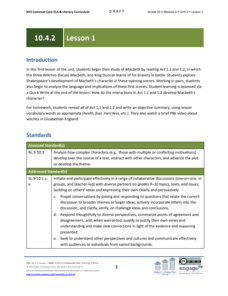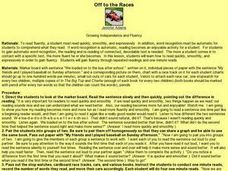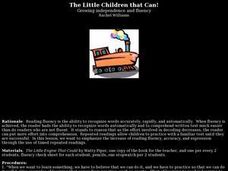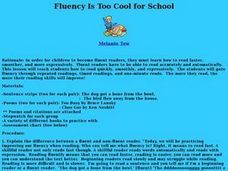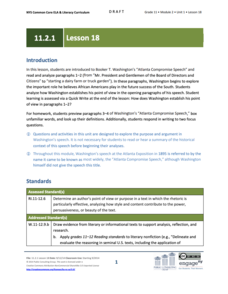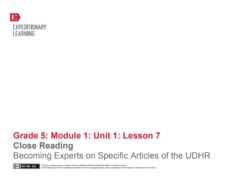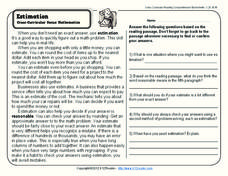iCivics
Mini-Lesson: Veto Power
No means no! Scholars analyze the impact of one of the president's most powerful tools—the veto—while also finding out ways to properly check facts for validity. They research the power of the presidential veto with paired activities and...
EngageNY
Grade 10 ELA Module 2: Unit 3, Lesson 2
Is good good enough? Scholars examine claims made in a speech by Elanor Roosevelt. Roosevelt claims that people should adopt the Universal Declaration of Human Rights because it is a good document. Readers discuss their ideas in pairs,...
EngageNY
Grade 10 ELA Module 4: Unit 2, Lesson 1
What do readers discover about a character within the first few sections of a text? Pupils begin reading Shakespeare's Macbeth and analyze the language in the first few scenes of the play. They also demonstrate understanding with a Quick...
EngageNY
Grade 11 ELA Module 1: Unit 2, Lesson 14
How do Ophelia's interactions with Hamlet help develop her character? Pupils continue reading Act 3.1 from Shakespeare's Hamlet. Using writing and discussion, scholars analyze the dialogue between Hamlet and Ophelia, paying particular...
Curated OER
Language Arts: Racing for Fluency
Young scholars improve fluency through drills to increase quickness and smoothness. In pairs, they practice reading sentences out loud, each time increasing their fluency. Finally, students play a game of timed readings using a stop...
Curated OER
Fluency Instructional Routine: Read Regular Words
How many words can you read in one minute? Practice reading fluency, speed, and accuracy with this scaffolded lesson plan. This offers a full script if you need it, however it can also be utilized as an outline. Demonstrate the activity...
Curated OER
On Your Mark, Get Set, Read!
Are your beginning readers trying to build fluency? Use this activity to teach them how to monitor their reading fluency. First they get a sentence to practice with, reading it to their partner once and rereading it silently five times....
Curated OER
Kites are Slow, Reading is Fast
Speed read with your third, fourth, and fifth graders. Learners pair up and work together to improve their oral fluency. Use the technique of covering up unknown words to isolate the vowel and decode the word. There's a sheet included to...
Curated OER
Letter Sound Fluency
How fast can you go? Test scholars' letter sound recognition with a timed game. Using letter cards of all the letters you've learned so far, learners take turns flipping cards and correctly saying the letter sound. Model this first,...
Curated OER
Reading Skills: Chunking
Prepare advanced English learners and low-level readers for the reading demands of post-secondary education with skill of chunking. Readers learn to make meaning from phrases rather than individual words, helping them to read more...
Curated OER
Third Grade Fluency Lesson
Third graders read passages of text in an effort to improve their fluency and reading comprehension. In this language arts lesson, 3rd graders read passages that are at their reading level, and attempt to increase their number of words...
Curated OER
Race into Fluency!
Elementary learners practice reading short passages to increase their fluency. They work in pairs to do repeated readings of Jane and Babe, recording their times. They switch roles and time one another in an effort to decrease the...
Curated OER
The Little Children That Can: Growing Independence and Fluency
Get ready to boost fluency in the classroom with this lesson geared toward elementary readers. Listening to the first half of The Little Engine That Could, learners focus on how voice changes create expression. They then...
Curated OER
Fluency Is Too Cool for School
What does a successful reader sound like? Help readers gain fluency and become successful readers through repeated readings of given poems. They use the cover-up method to help them decode new words and chart their progress as they...
Curated OER
Third Grade Fluency Lesson
Looking for an activity to increase fluency? Third graders will practice reading comprehension by expanding their reading level. They will demonstrate for their teacher their current reading level and then decide on a goal to be reached...
Curated OER
Reading Comprehension 2: Level 8
Need a quick assessment of your middle schoolers' reading comprehension skills? The four questions on this quiz ask readers to identify the likely source of the article, define words based on context, and identify the main idea of the...
Meadows Center for Preventing Educational Risk, University of Texas at Austin
Lesson 12 - Ed Suffix with Unchanging Base Words
Understanding different verb tenses begins with knowing how to decode words. A lesson on the -ed suffix with unchanging base words introduces readers to the past tense. Teachers present the skill with oral reading and spelling...
Council for Economic Education
Economic Data Lesson: Economic Policy Options
Can you make decisions that will impact millions of people around the nation? Scholars research the role of the Federal Reserve, and its Chairman, on the economic outlook of the country. They analyze current trends in unemployment,...
EngageNY
Grade 11 ELA Module 2: Unit 2, Lesson 12
Why is it important to make connections across texts? Scholars discover the answer with instructional activity 12 of 14 from the Grade 11 ELA Module 2: Unit 2 series. Pupils analyze the development of ideas in three nonfiction texts,...
EngageNY
Grade 11 ELA Module 2: Unit 1, Lesson 18
America's success depends on everyone. Scholars examine the first two paragraphs of Booker T. Washington’s "Atlanta Compromise" speech. They work in groups to answer questions and discuss Washington's perspective on African Americans'...
Have Fun Teaching
Making Inferences Something Special (13)
Work on making inferences with a reading passage and comprehension questions. After kids read a short paragraph about Jalisa's birthday, they infer why she would be excited about receiving gifts from her brother.
EngageNY
Close Reading: Becoming Experts on Specific Articles of the UDHR
A continuation of the previous lesson plan, which is part of a larger group of lessons on human rights (see additional materials). Here, in Lesson 7, your class will explore more articles from the Universal Declaration of Human Rights....
K12 Reader
Estimation
When is it a good idea to use estimation? Learn about estimation and rounding with a reading comprehension lesson. After kids read a passage about estimation, they answer five comprehension questions on the other side of the page.
K5 Learning
Why Does the Ocean have Waves?
Six short answer questions challenge scholars to show what they know after reading an informational text that examines waves—what they are, what causes them, and how different Earth factors affect their size and strength.


